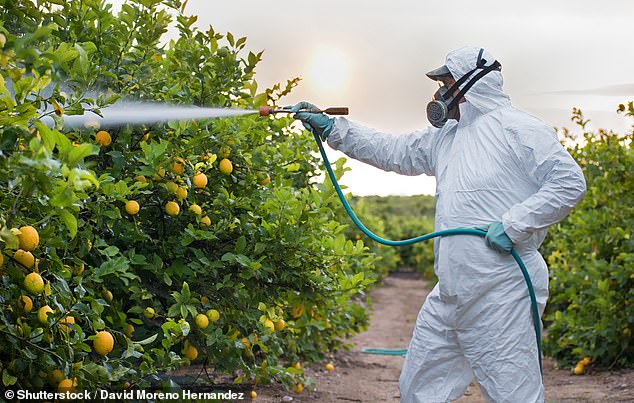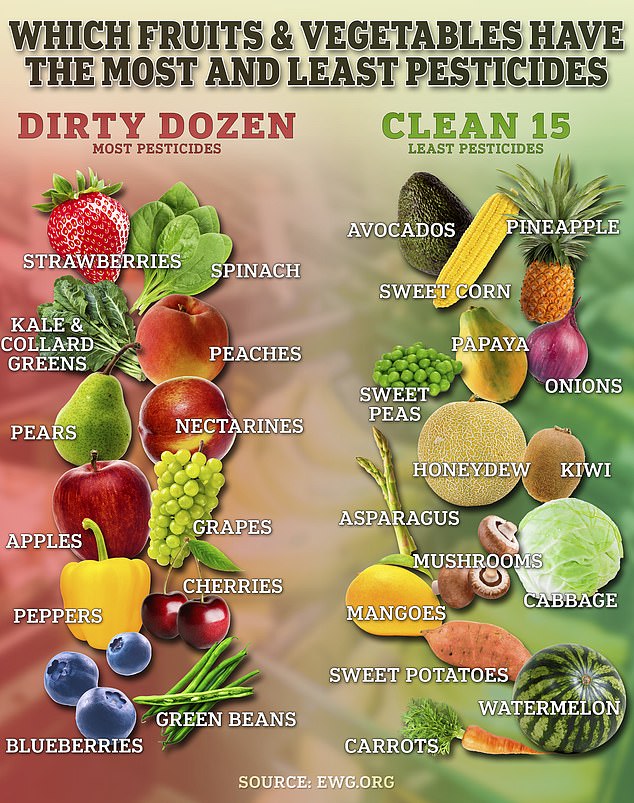Exposure to pesticides used in agriculture may cause as much damage to the body as smoking, a study suggests.
Researchers found that common chemicals used to grow fruits and vegetables in the U.S. were associated with higher levels of several types of cancer (including Hopkins lymphoma, leukemia and bladder cancer) than smoking.
Strawberries, spinach and collard greens, generally considered some of the healthiest foods you can eat, have been named among the produce laden with the most pesticides.
Researchers urge people to wash produce before eating it to limit pesticide consumption.
More than 90 percent of samples of strawberries, apples, cherries, spinach, nectarines and grapes had at least two pesticides, the EWG found.
Pesticides are a crucial aspect of modern agriculture. They protect produce from insects and ensure that a sufficient portion of the crop survives until the harvest season.
But this also means that chemicals remain in the products that reach homes and seep into the water.
In addition to reaching the fruits and vegetables that millions of people buy every day in supermarkets, pesticide runoff from irrigation and spraying of produce can contaminate nearby water and soil, thereby polluting drinking water and other crops.
Some research indicates that up to 80 percent of Americans have detectable levels of pesticides in their blood.
For the new study, researchers reviewed the health effects of 69 different pesticides, data for which are available from the U.S. Geological Survey.
Researchers said that because more than one pesticide is often used at a time, the culprit is likely the use of many of them together in a “cocktail.”
They compared these effects to the health effects of smoking on different types of cancer in the body. Smoking is commonly associated with lung cancer, but it can also lead to cancer of the mouth, larynx, throat, esophagus, stomach and other organs, as well as asthma, heart disease, stroke and chronic lung disease.
The US researchers said their study is the first comprehensive analysis of the cancer risk associated with pesticides in the context of a cancer risk that is no longer in question: smoking.
Dr. Isain Zapata, a professor at Rocky Vista University College of Osteopathic Medicine in Colorado and co-author of the report, said: “It’s difficult to explain the magnitude of a problem without providing any context, so we incorporated data on smoking. We were surprised to see estimates in similar ranges.”
Their findings were published in the journal Frontiers in Cancer Control and Society.

Common pesticides like glyphosate have been linked to developmental delays, blood cancer, organ damage, respiratory problems, ovarian and prostate cancer, and reproductive problems.
The full methods and results of the study have not yet been published. This article will be updated when those details are published.
The relationship between cancer rates and pesticide use was highest in the Midwest, where corn production is the main source of income for large sectors of the population.
The Environmental Working Group examines pesticide uses on fruits and vegetables and has reported that about 90 percent of the samples of strawberries, apples, cherries, spinach, nectarines and grapes tested positive for residues of two or more pesticides.
The EWG also reported finding between 13 and 23 pesticides in at least one sample of each food. Kale, collard greens, and mustard greens had the highest amounts of pesticides.
Dr. Zapata said: ‘Every time I go to the supermarket to buy food, I think of a farmer who participated in the production of that product.
“These people often take risks for my convenience and that influences my appreciation for that product. It has definitely had an impact on how I feel when that forgotten tomato in the fridge goes bad and I have to throw it away.”
Some of the most common pesticides that repel fungi and insects have been linked to cancer, developmental delays, fertility problems, and hormonal problems.
One of the most famous is glyphosate, widely known by the brand name Roundup. A growing number of studies, including a major one from the Department of Environmental and Occupational Health Sciences at the University of Washington, have pointed to cancer risks associated with Roundup.
The study found that use of the herbicide increases the risk of non-Hodgkin lymphoma by 41 percent.
Another study published last year saw American doctors measure glyphosate levels in 268 Farmers’ urine and signs of stress in cells. Higher levels of glyphosate were associated with more extensive stress in cells, also called oxidative stress, which can damage DNA and potentially cause cancer.
A CDC report found that out of 2,310 urine samples, which were supposed to be representative of the U.S. population, 80 percent were contaminated with glyphosate. Approximately one-third of these samples came from children between six and 18 years old.
However, the US Environmental Protection Agency maintains that “there is no evidence that glyphosate causes cancer in humans.”
Roundup’s makers, Monsanto and its owner Bayer AG, have repeatedly assured the public that their product is safe and poses no threat to human health.
Earlier this year, John McKivison, a 49-year-old Pennsylvania gardener, won a multimillion-dollar lawsuit against Bayer after he was diagnosed with non-Hodgkin lymphoma in 2020, which he and his lawyers successfully argued was the result of two decades of Roundup use.
McKivison successfully argued that Monsanto and its parent company Bayer were “negligent” and “failed to warn of the dangers” of their product.
Other common pesticides, such as chlorpyrifos, atrazine, paraquat and carbaryl, have been linked to low IQ and developmental delays in children, reproductive problems and birth defects, organ damage, Parkinson’s disease and cancers including blood, breast, prostate and ovarian cancer.
Some of the safest fruits and vegetables are those that have skins that are typically removed before eating, such as avocados, sweet corn, and pineapple.

